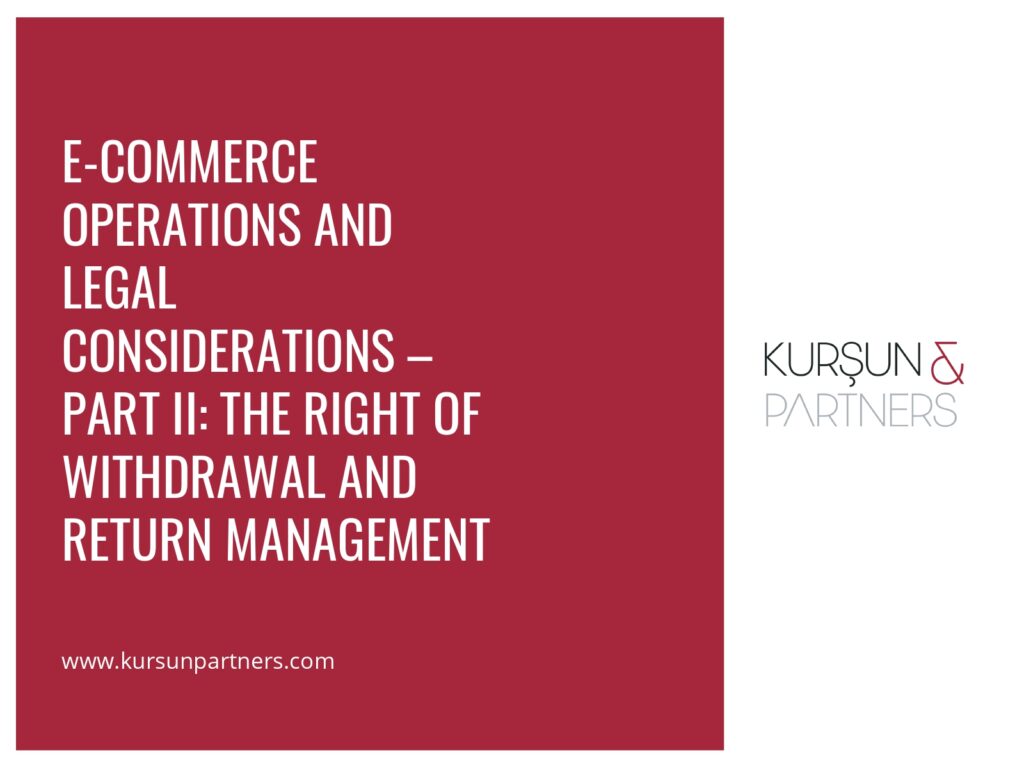In compliance with the Turkish Regulation on Distance Contracts, consumers engaging in e-commerce sales are entitled to exercise their right of withdrawal within a period of 14 (fourteen) days, without providing any justification, and request a full refund of the amount paid. This withdrawal period commences on the day the service contract is established or, in the case of delivery contracts, on the day the consumer or a third party designated by the consumer takes possession of the goods. During this timeframe, no penalties or charges will be imposed on the consumer.

While the right of withdrawal may not initially be a focal point when embarking on e-commerce operations, it swiftly evolves into one of the paramount considerations once immersed in the e-commerce market. Until the withdrawal period expires, the proceeds from e-commerce sales cannot be unequivocally deemed as profit for the e-commerce seller. Moreover, the exercise of the right of withdrawal for non-stock items post-delivery incurs a loss in terms of production costs. In scenarios where the resale of such products is not feasible, this loss becomes irrecoverable. Hence, when conducting a cost analysis of the right of withdrawal, it is imperative to acknowledge that the sales amount cannot be unreservedly regarded as actual profit during the delivery period and within the subsequent 14 (fourteen) days. Consequently, e-commerce enterprises must tailor their cash flow management in light of these factors.
There are specific products and services for which the right of withdrawal cannot be exercised. These include:
a) Contracts involving goods or services with prices influenced by financial market fluctuations beyond the seller’s or provider’s control.
b) Contracts concerning goods that are customized or tailored to the consumer’s specifications.
c) Contracts involving the delivery of perishable or expired goods.
d) Contracts concerning the delivery of sealed goods, such as packaging, tapes, seals, or packages, that, once opened after delivery, are unsuitable for return due to health and hygiene reasons.
e) Contracts pertaining to books, digital content, and computer consumables provided in a tangible format, if the protective elements like packaging, tapes, seals, or packages have been opened after delivery.
f) Contracts related to periodicals like newspapers and magazines, excluding those offered within a subscription agreement.
g) Contracts involving accommodation, transportation of goods, car rental, food and beverage supply, entertainment, or leisure activities scheduled for a specific date or period.
h) Contracts concerning services performed instantly in electronic form or the delivery of non-material goods provided instantly to the consumer.
i) Contracts for services that have commenced with the consumer’s approval before the expiration of the withdrawal period.
ı) Contracts relating to movable properties subject to compulsory registration as per the Road Traffic Law and unmanned aerial vehicles subject to registration or registration obligations. (Effective from 2024)
i) Contracts concerning mobile phones, smartwatches, tablets, and computers once delivered to the consumer. (Effective from 2024)
j) Contracts concluded through live auctions conducted as open bidding. (Effective from 2024)
k) Contracts associated with goods for which the seller or authorized service explicitly states in the promotional and usage guide that installation or assembly will be performed by the seller or authorized service. (Effective from 2024)
When venturing into e-commerce, it is crucial to assess the exceptions to the right of withdrawal for each product that will be sold. By doing so, you can effectively handle consumer withdrawal requests in accordance with the applicable regulations. Being aware of these exceptions enables you to provide accurate information to consumers regarding their rights and ensures a smooth and compliant e-commerce experience.
Consumer Obligations: The right of withdrawal is deemed to be exercised when it is communicated in writing or through the designated withdrawal notification tab on the website. Once this notification is sent, it becomes the consumer’s responsibility to return the goods to the seller within 10 (ten) days (extended to 14 days starting from 2024). It’s important to note that if the consumer uses the product in compliance with its intended functionality, technical specifications, and usage instructions during the withdrawal period, they shall not be held liable for any alterations or deterioration that may arise.
Seller’s Obligations: Once the seller is notified of the consumer’s decision to exercise their right of withdrawal, it becomes their duty to promptly refund all payments received, including any applicable delivery costs, within a period of 14 (fourteen) days. The seller is not permitted to offer an alternative such as issuing a sales voucher instead of providing a monetary refund unless specifically requested by the consumer exercising their right of withdrawal.
Return Costs: When exercising the right of withdrawal, if the consumer selects the carrier specified by the seller in the pre-information note (a legal document on the e-commerce website that should be provided by the seller) for returning the goods, the consumer shall not bear any responsibility for the return expenses. Starting in 2024, the seller will have the option to specify the carrier and return fee in the pre-information, provided that the return fee does not exceed the delivery cost, and request the consumer to cover this return fee. If the seller does not specify a carrier for the return in the pre-information note, no charges related to return expenses can be imposed on the consumer. In cases where the specified carrier for the return does not have a branch in the consumer’s location, it is the seller’s responsibility to arrange the collection of the returned goods from the consumer without requesting any additional expenses.
As evident, the obligations regarding return processes in relation to the exercise of the right of withdrawal are bound by specific timeframes. Non-compliance with these timeframes grants the consumer the right to claim interest. Taking all these factors into consideration, it is crucial to not only manage the cash flow associated with the right of withdrawal but also construct the return operation in alignment with the applicable deadlines.
